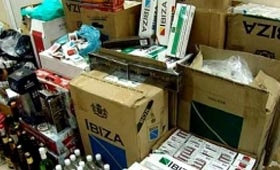Colombia’s government announced plans for a new anti-smuggling task force to counter the contraband trade, which is estimated to cost the country up to $5 billion per year.
The Anti-Smuggling Task Force (FEA) will monitor imported goods using new scanning systems, and satellite tracking, to be implemented at Colombia’s points of entry. The aim is to ensure that all goods coming into the country are tracked, with any anomalies, such as route deviations, instantly detected, reports Portafolio.
DIAN, Colombia’s tax and customs agency, seized $27 million in smuggled goods last year, up from the previous year’s $16 million. The goods most often seized include alcohol, gasoline from Venezuela, footwear, televisions, and mobile phones.
InSight Crime Analysis
The contraband industry is thought to cost the Colombian government between $1.5 billion and $5 billion annually in lost taxes. Many of these operations are run by small organizations with few or no ties to other types of organized crime. However, the government has expressed concern that some types of contraband, particularly liquor, are increasingly controlled by neo-paramilitary groups, labelled by the government as “criminal bands” (BACRIMs).
Historically, transnational criminal organizations in Colombia used the contraband trade to launder drug money, turning US dollars from their cocaine sales back into Colombian pesos. This was achieved mainly through “San Andresitos,” shopping areas offering smuggled goods at heavily discounted prices. The goods would be bought abroad in duty-free zones such as Panama, then smuggled to Colombian and sold in pesos.
The government has cracked down on these areas since the late 1990s, making it harder to launder drug profits in this way. However, in light of the continuing importance of the contraband trade, it is likely that transnational criminal groups maintain a significant hand in contraband operations.

